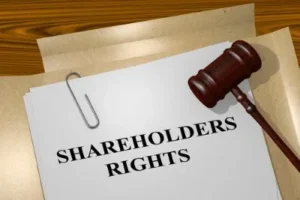SHAREHOLDER RIGHTS
LAW OFFICES OF TIMOTHY L. MILES
TIMOTHY L. MILES
(855) TIM-M-LAW (855-846-659)

Shareholders, or stockholders, own a portion of a company’s stock and have certain rights as a result of that ownership. These rights are typically outlined in the company’s charter and bylaws, and can vary depending on the class of shares (e.g., common or preferred stock) and whether the company is publicly traded or privately held. The following are some of the shareholder rights that common shareholders of a corporation possess:

Before addressing specific shareholder rights, we will discuss some of the basics of common shareholders.

Common stock refers to a type of security that represents ownership in a corporation. It is one of the most widely known and traded forms of stock in the market. Common stockholders have the right to vote on corporate matters and have the potential to receive dividends, which are a portion of the company’s profits distributed to shareholders. They also have the ability to participate in any appreciation in the company’s value through capital gains. Common stockholders rank after bondholders and preferred stockholders in terms of priority for receiving assets in the event of bankruptcy. Overall, common stock provides investors with an opportunity to share in the success and growth of a company.

An individual who has acquired at least one common share of a company is known as a common shareholder. These shareholders have voting rights are eligible to cast a ballot on corporate matters and are entitled to receive declared common dividends. In the case of bankruptcy, common shareholders are rewarded last, after debtholders and preferred shareholders.

One of the most fundamental shareholder rights of common shareholders is voting rights.
Common shareholders have the right to vote:
Shareholders may vote in person or by proxy vote if unable to attend.
When a company flourishes and is successful, the common shareholders own a piece of a company that therefore has value. The better a company performs and the significance its outlook, then the higher its valuation rises and the price that each share of ownership is worth. Therefore, if you own a stake in a company that keeps making profits, your piece of ownership will grow in value and be worth more than what you initially paid
Shareholders are typically entitled to receive a portion of the company’s profits in the form of dividends, when declared by the board of directors. Management of a company essentially has two options with profits: they can be reinvested back into the firm or paid out in the form of a dividend. Investors do not have a say as to what percentage of profits should be paid out—the board of directors decides this. However, whenever dividends are declared, common shareholders are entitled to receive their share
Shareholder rights also include common shareholders have right to examine basic documents, for example, the company bylaws and minutes of board meetings. Moreover, the Securities and Exchange Act of 1934 (Exchange Act) requires public companies to periodically disclose their financials. Two of the most important documents are the annual report and the Form 10-K which must be distributed to common shareholders.
The right to transfer ownership means common shareholders are allowed to trade their shares on an exchange. The right to transfer ownership is key, as the liquidity provided by stock exchanges is important.
Liquidity, which refers to the degree to which an asset or security can be quickly bought or sold in the market without affecting its price, is one of the key features that differentiates stocks from an investment such as real estate. Ownership of property can take months to convert that investment into cash.
However, because stocks are so liquid, investors can move their money into other places almost instantaneously
Shareholders may have the right to sue the corporation or its officers and directors in certain situations, such as for breaches of fiduciary duty, corporate mismanagement, or denial of their rights.
In the event of a company’s liquidation, shareholders have a claim on any remaining assets after creditors and bondholders have been paid.

Understanding these shareholder rights is important for anyone who invests in a company, as it allows them to participate in the company’s governance, influence its direction, and protect their investment
If you suffered substantial losses in any case and wish to serve as lead plaintiff in the case, or if you just have general questions about you rights as a shareholder, please contact attorney Timothy L. Miles of the Law Offices of Timothy L. Miles, at no cost, by calling 855/846-6529 or via e-mail at [email protected].
For more information on shareholder rights and securities law in general, please visit our Investor Resources Center and our Frequently Asked Questions page with answers to over 350 questions on every area of securities law, civil procedure and much more. Also, please see our Lead Plaintiff Deadline page which has a calendar when lead plaintiff motions are due in various securities cases.
We hope you enjoy, you will find a wealth of information on shareholder rights and securities law in general.
LAW OFFICES OF TIMOTHY L. MILES
TIMOTHY L. MILES
(855) TIM-M-LAW (855-846-6529)
[email protected]
(24/7/365)
Mon – Fri: 24/7
Sat – Sun: 24/7